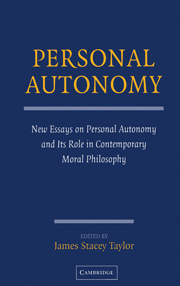Book contents
- Frontmatter
- Contents
- List of Contributors
- Acknowledgments
- Introduction
- PART I THEORETICAL APPROACHES TO PERSONAL AUTONOMY
- PART II AUTONOMY, FREEDOM, AND MORAL RESPONSIBILITY
- 8 Autonomy and Free Agency
- 9 The Relationship between Autonomous and Morally Responsible Agency
- 10 Alternative Possibilities, Personal Autonomy, and Moral Responsibility
- 11 Freedom within Reason
- PART III THE EXPANDING ROLE OF PERSONAL AUTONOMY
- Index
9 - The Relationship between Autonomous and Morally Responsible Agency
Published online by Cambridge University Press: 03 December 2009
- Frontmatter
- Contents
- List of Contributors
- Acknowledgments
- Introduction
- PART I THEORETICAL APPROACHES TO PERSONAL AUTONOMY
- PART II AUTONOMY, FREEDOM, AND MORAL RESPONSIBILITY
- 8 Autonomy and Free Agency
- 9 The Relationship between Autonomous and Morally Responsible Agency
- 10 Alternative Possibilities, Personal Autonomy, and Moral Responsibility
- 11 Freedom within Reason
- PART III THE EXPANDING ROLE OF PERSONAL AUTONOMY
- Index
Summary
What is the relationship between the concepts of autonomous and morally responsible agency? For those who acknowledge the legitimacy of each, the assumption has been that the connection is quite tight: Either it is thought that they entail each other or, more conservatively, that autonomous agency is necessary for morally responsible agency. I shall argue that, on one reasonable account of autonomy, neither is necessary for the other. My argument turns upon establishing two theses: First, the epistemic condition for autonomous agency involves less than what is required for morally responsible agency. Second, the control condition for autonomous agency involves more than what is required for morally responsible agency. If the first thesis is correct, it is possible for a person to satisfy all of the conditions for autonomous agency and yet fail to satisfy the more demanding epistemic condition for morally responsible agency. This would prove that morally responsible agency is not necessary for autonomous agency. If the second thesis is correct, it is possible for a person to satisfy all of the conditions for morally responsible agency and yet fail to satisfy the more demanding control condition for autonomous agency. This would prove that autonomous agency is not necessary for morally responsible agency.
TWO CONCEPTS: AUTONOMOUS AGENCY AND MORALLY RESPONSIBLE AGENCY
To begin, let us treat autonomous agency in terms of self-rule, and let us assume that it is not a necessary condition of personhood but merely demarcates a special class of persons. Parsed accordingly, it is possible that some persons are nonautonomous.
- Type
- Chapter
- Information
- Personal AutonomyNew Essays on Personal Autonomy and its Role in Contemporary Moral Philosophy, pp. 205 - 234Publisher: Cambridge University PressPrint publication year: 2005
- 12
- Cited by

